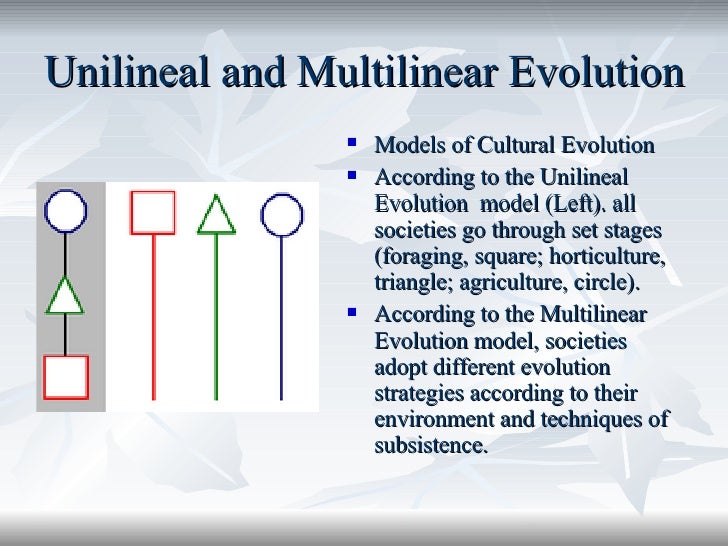 The issue of unilinear cultural evolution was recently raised in a discussion of memes and cultural evolution:
The issue of unilinear cultural evolution was recently raised in a discussion of memes and cultural evolution:
A major critique with the concept of using memetics and the concept of cultural-evolution as analogy is that it perpetuates neo-evolutionary theories from the 1960's that posited ideas of culture unilineally evolving from simple to complex (the same stuff that Herbert Spencer was talking about in the 19th century).
My reply follows:
Cultural evolution is sometimes smeared by its opponents for promoting what is generally known as unilinear cultural evolution.The biggest problem with this smear is that unilinear evolutionary theories have been out of fashion in biology for a hundred years. We now know that evolution produces tree-shaped bushes, not ladders.
This is an emotive issue, since the "ladder of progress" model with westerners at the top was historically used to help justify slavery and genocide.
Also, it has become pretty obvious that cultural evolution is directional - taking humanity from apes to angels. The cultural evolution theorists from a hundred years ago were factually correct about there being a direction to cultural evolution. In the era of Moore's law, progress denialism is looking increasingly stupid.
Darwin famously wrote in a notebook: "Never say higher or lower". There's some wisdom in this advice, but it seems stupid to apply it to cultural evolution - since that is so clearly and obviously directional.
I think the concern about the concept of cultural progress is that it will be again used to justify the extermination of those lower on the ladder.
It isn't clear whether this fear is justified or not. There's no evidence that knowledge of evolutionary theory is correlated with misdeeds. One thing is fairly clear: cultural progress itself has led to massively reduced rates of homicide and massively increased life expectancies.
Anyway, whether the idea of cultural progress causes people to exterminate each other doesn't bear on whether the idea is true. That would be like arguing that atomic theory is wrong because, if true, it might lead to atom bombs - which could kill millions.
A bishop's wife once declared:
My dear, descended from the apes! Let us hope it is not true, but if it is, let us pray that it will not become generally known.This revulsion towards evolutionary theory has afflicted many historically, and caused them to argue against evolutionary theory - and in particular its applicability to humans.
In my opinion, the arguments by many anthropologists against applying evolutionary theory to human culture are best seen in this light. They are motivated cognition. Not only are biologists invading anthropological turf, they are doing so using a horrible, dreadful, theory that will only lead to economic dog-on-dog competition and a callous indifference to the suffering of others.
In my opinion, the best argument anthropologists have is that previous attempts to applying evolutionary theory to human culture have been simple minded. This criticism applies to Wilson-style sociobiology - which tries to boil everything down to genes - and to evolutionary psychology - which has mostly focused on human universals, and whose theories of culture have been things like the simple-minded 'jukebox' model. However, memetics acknowledges the importance of human culture, granting anthropologists one of the things they have been saying for a century or so - that culture is big and important influence on human behaviour. One of the early pioneers of the topic - Donald T Campbell - was an anthropologist.
Perhaps evolutionists will inevitably make some mistakes with their new theory. However Darwinian denialism is surely profoundly worse. This is the head-up-the-backside approach to evolutionary theory that has kept anthropology in a pre-Darwinian time warp for over 150 years now.










No comments:
Post a Comment